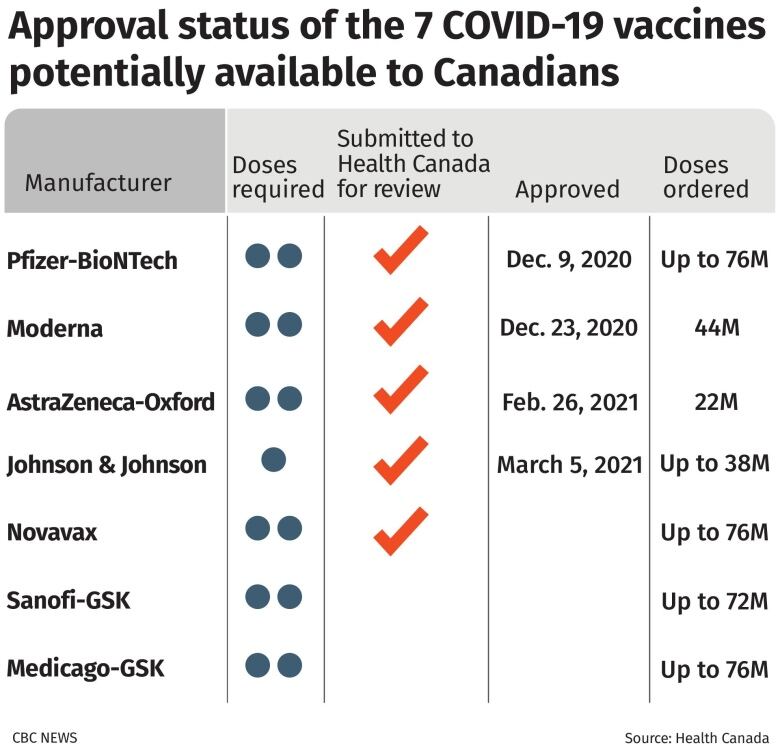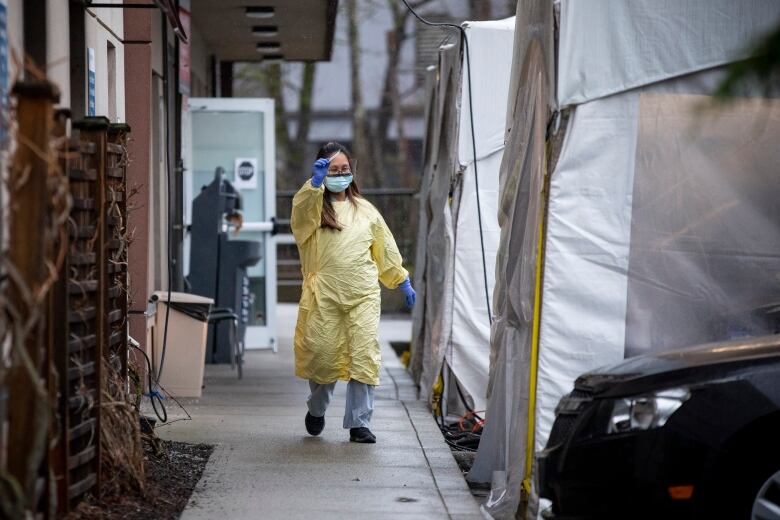Do we know how effective vaccines are against the variants? Your COVID-19 questions answered
Also, will full clinical trials be needed to approve booster shots?

We're answering your questions about the pandemic. Send yours to COVID@cbc.ca, and we'll answer as many as we can. We publish a selection of answers online and also put some questions to the experts during The National and on CBC News Network. So far, we've received more than 71,000 emails from all corners of the country.
Are the vaccines effective against the variants of concern?
Pfizer-BioNTech and Moderna say their COVID-19 vaccines appear to be effective against two variants of concern first identified in the U.K. and South Africa, based on blood samples from people who have been vaccinated. But more research is needed on both vaccines.
Other vaccinesalready have some real-world data on their effectiveness against the variants.
Recent evidence from the UnitedKingdom shows that the B117 variant is a more contagious strain which causes more severe illness in the elderly and in younger age groups, said Dr. Theresa Tam, Canada's chief public health officer.
"As the number of new variant cases continue to increase, they account for a greater proportion of COVID-19 casesacross Canada, reminding us of how tight the vaccines versus variants race continues to be," Tam said.
The good news is the coronavirus that causes COVID-19 doesn't seem to mutate as much or as quickly as the influenza virus that causes theflu.
Drugmakers are already re-working their vaccines to account for variants of concern.
Phil Dormitzer, one of Pfizer's top viral vaccine scientists, said in Februarythat his company has already made a template for a prototype vaccine targeting the variant first identified in South Africa.

Dr. Supriya Sharma, Health Canada's chief medical adviser, said both laboratory tests and real-world evidence showthe AstraZeneca-Oxford vaccineseems to be "quite effective" against the B117 variant first identified in the United Kingdom.
But the re-tooling plans took on new urgency after South Africa paused its rollout of the AstraZeneca vaccine after data from a small trial suggested the vaccine did not protect against mild to moderate illness from the B1351 variant now dominant in the country.
The lab research, which has not yet been peer-reviewed,involved takingblood from people who've been vaccinated to see how it performs in antibody tests against that B1351.
Sharma said that's not the only immune response and more information is needed.
"Where it matters the most, against severe disease, hospitalization and death, it seems to be quite effective against the variant," Sharma said.
The clinical trials of both Moderna and Pfizer-BioNTechwere completed before the variants of concern took off worldwide.
Dr. Noni MacDonald, apediatrics professor at Dalhousie Universityin Halifax and a vaccine safety researcher, said as experts gain a more detailed and sophisticated perspective on how the COVID-19 vaccines work, they'll also gain a better understanding of what types of protection they offer.
Do we know how effective other vaccines are against B1351?
Yes, we do have some information about the other vaccines.
So far, three drugmakers Johnson & Johnson, AstraZeneca-Oxford and Novavax have data comparing how well their vaccines work against the B1351 variant first identified in South Africa.
The variant has a mutation that changes the shape of the viral spike protein.
As a result, lab experiments suggestthe antibodies that our body produces have a harder time attaching to the spike protein, reducing the effectiveness of the vaccines, virologists say.
But infectious disease experts say the vaccines could still save lives amid B1351 cases by preventing admissions to intensive care from serious COVID-19, which reduces strain on our health-care systems the goal of flattening the curve.
Experts with the World Health Organization said in their March 23 report that results for Novavax and Johnson & Johnsonagainst B1351 are pending.
Preliminary data from Johnson & Johnson's subsidiary,Janssen, suggested asingle-dose was 72 per cent effective against moderate to severe COVID-19 in the U.S. compared with 57 per cent effective in South Africa, where a more contagiousvariant was circulating at the time of the research.
WATCH | Re-tooling vaccines to keep up with coronavirus variants:
The Novavax vaccine also showed some protection against the B1351 variant, said Dr. Isaac Bogoch, an infectious diseases physician with Toronto's University Health Network.
In a newsrelease,Novavaxsaid the efficacy of its vaccine in studies fromthe U.K. was 89 per cent compared to60 per cent in South Africa.
Protection can refer to not getting the infectionas well as protection against severe infection, hospitalization and death.
"So, while it isn't perfect, while it isn't the same, Johnson & Johnson, Novavax and very likely Pfizer and Moderna still provide some element of protection against that variant of concern," said Bogoch, who is also a member of Ontario's COVID-19 vaccine distribution task force.
We're hearing the variant first identified in the U.K. can be more deadly. Is this across all age groups?
"Based on the limited evidence we have, it does seem to be across all age groups," Maria Sundaram, an infectious diseases epidemiologist based in Toronto,toldCBC News Network.
In January, British Prime Minister Boris Johnson said two studies presented to his government suggested the B117 variant "may be associated with a higher degree of mortality."
Patrick Vallance,Johnson's chief scientific adviser, said the previous average death rate of 60-year-olds in the U.K. from COVID-19 was about 10 per 1,000. With the new variant, roughly 13 or 14 per 1,000 infected people might be expected to die.
The relative increase in the case fatality rate"appears to be apparent across age groups," the researchers wrote. "The absolute risk of death per infection remains low."
Do you anticipate we'll need booster shots to protect against variants even after we've received both doses of a vaccine?
The answer is yes, said Bogoch.
For the first-generation of COVID-19 vaccines,Bogoch said he expects people will eventually needa booster dose.
"Down the line, and I am not sure how much farther down the line, we'd likely need a booster dose with a vaccine or an updated vaccine that accounts for the new variants of concern that are emerging," hesaid.

MacDonald said major regulators such as Health Canada, the U.S. Food and Drug Administration and their counterparts in the U.K. and Europe are meeting virtually to discuss how to evaluate the effectiveness of vaccines againstvariants.
She said the regulators may askdrugmakers for what arecalled non-inferiority studies.
Unlike clinical trials to evaluate the efficacy of a vaccine that involve40,000 to 50,000 people, MacDonald said non-inferiority trials need 400 to 500 peopleand can be done relatively quickly.
"We'll do non-inferiority," MacDonald said. "That is a simpler, easier process and it's just saying, 'Are you good if not better than what you had before?'"
Alyson Kelvin, a virologist working on COVID-19 vaccine candidates at VIDO-InterVac in Saskatoon,said surveillance in Canada and around the world will be important to see what variants people are commonly being infected with, both in vaccinated and unvaccinated populations.
"I am optimistic that we'll still have effective vaccines and we won't get into as frequently a cycle of vaccination and changing the vaccine formulations as we do with influenza," Kelvin said.

When someone is infected with the original version of the virus and they develop antibodies, those antibodies have been shown to be less effective against some new variants of concern with altered spike proteins.
Researchers have documented cases of reinfection with the variant first identified in Manaus, Brazil. But reinfections are difficult to prove since doctors need genetic proof showing adistinct coronavirus variant caused each instance of infection.
Our bodies generate antibodies to fight off a natural infection.Besides antibody-based immunity, our immune system also has T-cell immunity, or cell-based immunity. T cells are a type of white blood cell.
Kelvin said cell-based immunity isoften broader than what we get from just antibodies.
Immunologists say antibodiesare also relatively short-lived compared with someT cells.
Kelvin said itwill be important for researchers to watch for any breakthrough infections from a variant that suggest both arms of immunity are no longer effective.

Brian Lichty of the McMaster Immunology Research Centre in Hamilton, who is also working on COVID-19 vaccine candidates, said genes for the variants can be swapped into an existing mRNA vaccine, such as those made by Pfizer-BioNTech and Moderna.
"Technically, it's really simple," Lichty said. "I can, with my laptop, design a new vaccine in 20 minutes sitting on my couch."
Then, in the lab, the new gene is synthesized. Finally, the new vaccine is mass manufactured the step that takes the most time, he said.
Looking ahead, drugmaker GlaxoSmithKline (GSK) said it will work with the German pharmaceutical company Curevac to develop an mRNA vaccine against the variants.
The advantage of existing mRNA vaccines from Pfizer-BioNtech and Modernacompared with vaccines based on older technologiesis theydon't need cells or tissue culture to grow.That's one reasonwhy it is easier to change recipes in their manufacturing lines to address the variants, MacDonald said.
With files from CBC's Christine Birak and Associated Press













_(720p).jpg)


 OFFICIAL HD MUSIC VIDEO.jpg)
.jpg)



























































































